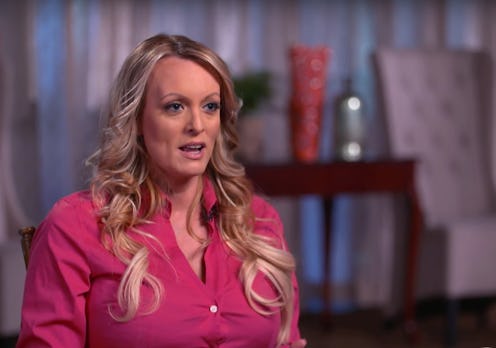News
How Stormy Daniels’ Lawyer Is Trying To Force Trump To Testify Under Oath
In the latest development of the current scandal plaguing the White House, Michael Avenatti, Stormy Daniels' lawyer, is trying to make Trump testify under oath. He filed a court request Wednesday to force both the president and Michael Cohen, Trump's own attorney, to be deposed for a maximum of two hours.
The request is part of a complaint that Avenatti filed against Trump on Monday: He hopes that a deposition will force Trump to admit whether or not he knew about the $130,000 payment Cohen gave Daniels in October 2016. The money was reportedly meant to secure Daniels' silence about an alleged affair she had with Trump for about a year, starting in 2006 (the president continues to deny that they had a sexual relationship).
Avenatti's deposition request claims that the nondisclosure agreement "did not have lawful object or purpose." It adds:
Rather, the Agreement and the $130,000 payment made pursuant to the Agreement, was for the 'purpose of influencing' the 2016 presidential election by silencing Plaintiff from speaking openly and publicly about Mr. Trump just weeks before the 2016 election.
On Twitter on Wednesday, Avenatti wrote that he was confident the court would grant his request for Trump and Cohen to testify. A federal court in California will hold a hearing to decide on April 30. If it approves Avenatti's motion, Trump and Cohen will be required to depose within 21 days. In other words, we could hear Trump testify about the Daniels scandal before the end of May.
The complaint that Avenatti filed on Tuesday is a revision of the ongoing case he and Daniels have against Trump and Cohen. This amended complaint claims that the $130,000 hush agreement should "be declared void" for several reasons. Some are New York-specific — Avenatti argues that Cohen's payment violated the state's "Professional Conduct" rules "by advancing or guaranteeing financial assistance to a client," and that it was meant for "covering-up adulterous conduct, a crime in New York."
The complaint also tries to discredit the hush agreement for its effect on the 2016 campaign. It argues that the agreement hid information about a presidential candidate that should have been public before the election and that Cohen's payment illegally circumvented campaign finance law.
The by-now familiar arguments that the agreement is void because Trump never signed it and Cohen spoke publicly about it also appear in the complaint, as does an attack on the agreement's "unconscionability": The complaint argues that the $1 million Daniels is supposed to pay each time she speaks out about the alleged affair is an unreasonable attempt to "financially cripple" her.
There's one more key argument, and it's where Avenatti's attempt to force Trump to testify under oath comes in. Avenatti claims that Cohen wasn't allowed to enter into the agreement without his client's knowledge. White House Press Secretary Sarah Huckabee Sanders told reporters earlier this month that Trump didn't know that his lawyer had paid Daniels hush money — or at least, that she wasn't "aware" of any sign that he knew. Avenatti's amended complaint argues that Cohen would have broken New York Rules of Professional Conduct if he didn't tell Trump about the agreement. Avenatti hopes to learn whether Trump actually knew of the bribe during the deposition, if it is granted by the court.
Throughout the Trump-Daniels scandal, Avenatti has been focused not just on nullifying the nondisclosure agreement but also on making his client's case as high-profile and sympathetic to the public as possible. He's been helping Daniels trickle out bits of her story in order to maximize its impact and maintain suspense. He teases upcoming reveals in interviews and on social media, and he writes heated posts on Twitter that draw even more attention to Daniels. These tactics seem tailor-made for his opponent: Trump takes television coverage very seriously, and the unfolding of the Daniels scandal has been TV gold.
David Schwartz, a spokesperson for Cohen, has acknowledged the game Avenatti is playing. "His court is not the court of law," he told Politico. "It's the court of public opinion."
